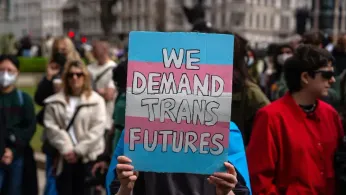
5 hours ago
Democrats’ Election Wins Signal Rejection of Anti-Transgender Rhetoric
READ TIME: 2 MIN.
Democratic candidates in several high-profile 2025 races secured decisive victories despite, and in some cases because of, widespread anti-transgender rhetoric from their opponents. In Virginia and New Jersey, where gubernatorial contests attracted national attention, Democratic nominees won amid campaigns that featured persistent attacks on transgender rights and access to gender-affirming care. According to strategists and LGBTQ+ advocacy organizations, these results serve as a rebuke to the idea that targeting transgender people is a winning electoral strategy, and instead demonstrate that standing firmly for transgender protections can be politically successful .
In Virginia, Democratic candidate Abigail Spanberger won the governorship by a 13-point margin over her Republican opponent, who had centered much of her campaign on anti-transgender messaging. Reports indicate that over half of Republican ad spending in the race promoted anti-transgender themes, but voters ultimately rejected this approach, signaling fatigue with so-called ‘culture war’ politics . New Jersey’s gubernatorial election followed a similar pattern, with Democratic candidate Rasheedah Jones prevailing despite – or arguably because of – attacks on transgender rights from her opponent. LGBTQ+ organizations, including Garden State Equality, attributed these wins to robust voter turnout among LGBTQ+ people and their allies, as well as effective outreach highlighting the tangible impacts of anti-transgender legislation
Transgender advocates and community leaders have described these election outcomes as both a relief and a call to continued vigilance. Many noted the emotional toll of enduring relentless negative campaigning but emphasized the empowerment they felt seeing voters reject divisive tactics. Erica Deuso, a transgender woman who appears to have won the mayoral race in Downingtown, Pennsylvania, despite targeted attacks, stated that focusing on real community issues resonated more with voters than responding to anti-transgender rhetoric . National organizations such as the Human Rights Campaign underscored that these results will bolster efforts to fight ongoing legislative attempts to restrict gender-affirming care and participation of transgender youth in sports .
The 2025 election cycle unfolded against a backdrop of increased legislative efforts to curtail transgender rights at both state and federal levels. Over one-third of U.S. states have enacted laws restricting transgender students’ participation in sports or access to healthcare consistent with their gender identity . In response, federal lawmakers, led by House Democrats, introduced the EQUITY Act, aiming to secure nondiscrimination protections for transgender service members and reinforce diversity, equity, and inclusion initiatives across the military . Party leaders have pointed to the year’s election results as validation of their stance and as a mandate to pursue further protections for transgender Americans.
Party strategists and civil rights leaders argue that the 2025 elections provide a template for future campaigns: direct engagement with LGBTQ+ communities, explicit support for transgender rights, and a focus on voters’ everyday concerns can overcome attempts to use transgender people as political scapegoats . The outcomes suggest that the electorate is increasingly resistant to divisive social issue campaigning, and that inclusive, affirming messaging resonates with a broad swath of American voters.






